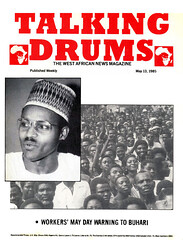What The Papers Say
The Guardian, Nigeria,
Not yet, census
May 2, 1985The advantages of an accurate census for a nation are not in doubt. And the sundry advocacy for one which has gained momentum in recent months is a continuation of persistent calls by the late Ayodele Awojobi.
The late Awojobi of Lagos University shouted himself hoarse in pleas for a headcount. The facts speak for themselves:
Nigeria is over-ripe for a census. The last count was in 1973. It turned out to be a barren exercise, with results worse than the 1963 controversial figures;
Socio-economic plans will become guess work in the absence of a count; In world records, atlas, maps etc, only outdated figures can be used on Nigeria;
This country suffers odium in the community of nations and is made to grin and bear it as a people that cannot count themselves.
The hue and cry which has afflicted the nation, can, there- fore, be seen to have been motivated by patriotism and the shame of seeing our planning as a blindman's buff. Awojobi wanted the United Nations called in for the exercise that would be supervised by the armed forces. Since his sugges- tion, there have been some other brilliant ones from other quarters.
The problem in our land has never been a lack of bright ideas but sensible planning, and execution. And in the case of the census, political dishonesty is the inhibition. The question therefore, is: Are we politically mature for a census?
The answer is no.
The post-independence exercises were bedevilled by impure urge for political advantages over other compon- ents. Because the government is literally the dispenser of all favours, competition for the reins of power is keen, made worse by the inchoate nature of our representative democracy while it lasted. Under the military itself, there have been complaints about the composition of the highest policy-making body and distribution of offices. Although our country is well-endowed, its human and material resources have not been fully developed to produce abundance. The sharing of what is available is not equitable. The result is an unhealthy and untrammelled struggle by each group to outsmart the other in the allocation of the re- sources. Revenue allocation has been a touch issue among others.
The retired Chief Justice, Sir Adetokunbo Ademola, commenting on the 1973 census exercise said that it appeared that every conceivable effort was made in some areas to falsify results. "Sectional interests still take precedence over national interests. Nigeria could only come up with a more judicious method of population headcount with a new breed of nationalists who would be devoid of all negative forms of ethnic inclinations," he told a Lagos magazine. Sir Adetokunbo is a moderate and an accommodating man. The census he described above was con- ducted by a military government. As recent as 1983, a mini- headcount was done called Registration of Voters. It was a disaster. The question the nation faces is: What do we then do?
The National Population Bureau and the office of statistics should from time to time update the existing figures using their own parameters. Their efforts will be helped by registration of births and deaths. At present, state governments and councils embark on vigorous tax drives. Hospital and tax records as well as primary school enrollment may also help projections.
The United Nations should be permitted its continual updating exercises. The government itself is working hard to procure identity cards for the citizens.
Our ego may be hurt by our inability to conduct a census now. It is better than another round of hate and political upheaval. The unity of the country is far from the ideal. It needs all the good will and encouragement from all good people. It is, therefore, only wise to allow the dog of a sleeping census to lie.
Bonn summit approves debt negotiations
Negotiations to ease the burden on debtor nations in respect of their commercial and official debts estimated at between $500 billion and $800 billion have been given the seal of approval at the economic summit of the leaders of seven industrial nations in Bonn last week.At the end of the summit the leaders of USA, Canada, Japan, Britain, France, Italy and host nation West Germany endorsed recommendations from an earlier meeting of western world finance ministers to press for multi year re-schedulings of the debts of developing countries.
Extracts from the text of the Bonn declaration captioned "towards sustained growth and higher employment" relating to third world affairs noted that sustained growth in world trade, lower interest rates, open markets and continued financing in amounts and on terms appropriate to each individual case are essential to enable developing countries to achieve sound growth and overcome their economic and financial difficulties.
Flows of resources, including official development assistance, should be maintained and wherever possible, increased, especially to the poorer countries. In particular, more stable long-term finance, such as direct investment from industrial countries, should be encouraged.
The leaders welcomed longer term debt restructuring agreements between debtor countries and commercial banks and said they would continue to stand ready, where appropriate, to negotiate further, multi-year reschedulings of debts to governments and government agencies.
They expressed deep concern about the plight of African peoples who are suffering from famine and drought. and welcomed the positive response from individuals and from private organisations, as well as the substantial assistance provided by the governments of many countries and the establishment by the World Bank of the Special Facility for Sub Saharan Africa.
They emphasized the need to examine the establishment of a research network on dry zone grains and pledged to strengthen their cooperation with African countries in fighting against desertification.
